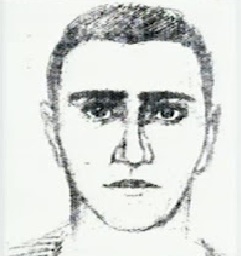
Bulgarian police sketch of a man believed to be either an accomplice or the bomber in a terror bombing aimed at Israeli tourists in the resort town of Burgas on July 18, 2012.
But European ministers who demand hard evidence of Hezbollah involvement are not likely to find it in the Bulgarian report on the investigation, which has produced no more than an "assumption" or "hypothesis" of Hezbollah complicity. Major revelations about the investigation by the former head of the probe and by a top Bulgarian journalist have further damaged the credibility of the Bulgarian claim to have found links between the suspects and Hezbollah.
The statement made on Feb. 5 by Interior Minister Tsvetan Tsvetanov referred to what he called a "reasonable assumption" or as a "well-founded assumption," depending on the translation, that two suspects in the case belonged to Hezbollah's "military formation."
Underlining the extremely tentative nature of the finding, Tsvetanov used the passive voice and repeated the carefully chosen formulation for emphasis: "A reasonable assumption, I repeat a reasonable assumption, can be made that the two of them were members of the militant wing of Hezbollah."
The host of a Bulgarian television talk show asked Tsvetanov on Feb. 9 why the conclusion about Hezbollah had been presented as "only a guess." But instead of refuting that description, Tsvetanov chose to call the tentative judgment a "grounded hypothesis for the complicity of the Hezbollah military wing."
The reason why the senior official responsible for Bulgarian security used such cautious language became clear from an interview given by the chief prosecutor for the case, Stanella Karadzhova, who was in charge of the investigation, published by "24 Hours" newspaper on Jan. 3.
Karadzhova revealed how little was known about the two men who investigators believe helped the foreigner killed by the bomb he was carrying, but whom Tsvetanov would later link to Hezbollah. The reason, she explained, is that they had apparently traveled without cell phones or laptops.
Only two kinds of information appear to have linked the two, according to the Karadzhova interview, neither of which provides insight into their political affiliation. One was that both of them had led a "very ordered and simple" lifestyle, which she suggested could mean that they both had similar training. The other was that both had fake Michigan driver's licenses that had come from the same country. It was reported subsequently that the printer used to make the fake Michigan driver's licenses had been traced to Beirut.
Those fragments of information were evidently the sole basis for the "hypothesis" that that two of the suspects were members of Hezbollah's military wing. That hypothesis depended on logical leaps from the information. Any jihadist organization could have obtained fake licenses from the Beirut factory, and a simple lifestyle does not equal Hezbollah military training.
But Karadzhova's biggest revelation was that investigators had found a SIM card at the scene of the bombing and had hoped it would provide data on the suspect's contacts before they had arrived at the scene of the bombing. But the telecom company in question was Maroc Telecom, and the Moroccan firm had not responded to requests for that information.
That provenance of the SIM card is damaging to the Hezbollah "hypothesis," because Maroc Telecom sells its cards throughout North Africa -- a region in which Hezbollah is not known to have any operational bases but where Al-Qaeda has a number of large organizations. Morocco is also considered a "staunch ally" of the United States, so it is unlikely that the Moroccan government would have refused a request from the United States to get the necessary cooperation from Moroccan Telecom.
Senior Bulgarian officials have remained mum about the SIM Card, and Karadzhova was sacked as chief prosecutor shortly after the interview was published, ostensibly because the interview had not been approved.
On Jan. 17, the sister publication of "24 Hours," the weekly "168 Hours," published an article by its editor, Slavi Angelov, reporting that the Bulgarian investigators had failed to find any evidence of Hezbollah involvement. Angelov, one of the country's premier investigative journalists, also wrote that one of the two suspects whose fake IDs were traced to Beirut had been linked by a "closely allied intelligence service" to a wing of Al-Qaeda.
The story, which is not available on the Internet but was summarized on the "24 Hours" website, earned a brief reference in a Jan. 17 story in the "Jerusalem Post." That story referred to Angelov's sources for the information about the Al-Qaeda link as unnamed officials in the Interior Ministry. The Angelov story's revelation that Bulgaria had no evidence linking Hezbollah to the bus bombing was also headlined by the Jewish Telegraphic Agency on the same day.
By the time the investigation's four-month extension was due to expire on Jan. 18, there was no question among investigators that they needed much more time to reach any meaningful judgment on who was responsible for the bombing. Chief prosecutor Karadzhova told "24 Hours" there was "no obstacle to the deadline being extended repeatedly."
But by mid-January, international politics posed such an obstacle: the United States and Israel were already pointing to the Feb. 18 meeting of EU foreign ministers as an opportunity to get action by the EU on listing Hezbollah as a terrorist organization. Washington and Tel Aviv wanted a conclusion from the Bulgarians that could be used at that meeting to force the issue.
(Note: You can view every article as one long page if you sign up as an Advocate Member, or higher).





